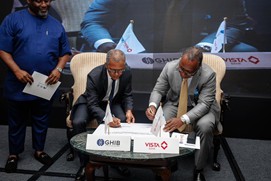
The strategic alliance was unveiled at CNVERGE ’25, GHIB’s flagship conference held in London under the theme “Rethinking Commodity Finance for Growth.” The agreement positions GHIB as the primary correspondent banking partner for Vista Bank’s operations in Gambia, Senegal, Sierra Leone, Burkina Faso, and Guinea.
Formalised during a signing ceremony attended by senior executives from both institutions, the partnership is set to strengthen intra-African banking cooperation and bridge regional financial systems with global markets.
“This partnership is a tangible expression of our commitment to be Africa’s bridge to international finance and correspondent banking,” said Dean Adansi, Chief Executive Officer of GHIB. “We provide African banking groups like Vista with critical access to funding, trade finance, and global payments—access we’ve consistently delivered since 1959.”
Under the new framework, GHIB will offer Vista Bank Group a comprehensive suite of correspondent banking services, including international credit lines, trade finance instruments, and cross-border payment capabilities. The initiative, branded TradeBridge, is designed to empower small and medium-sized enterprises (SMEs) across West Africa to compete more effectively in global markets.
Vista Bank Group, through its parent company Vista Group Holding SA, operates as a pan-African financial services organisation with a strong focus on SME banking, trade finance, leasing, and banc assurance. Its presence in key West African markets positions it as a vital player in regional economic development.
“GHIB has become our gateway to the global financial system,” said Serge Raymond, Managing Director of Vista Bank France. “Where other international banks have fallen short, GHIB has shown genuine commitment to African development. This partnership allows us to serve the backbone of our economies—the SMEs in Banjul, Dakar, Freetown, Ouagadougou, and Conakry—with world-class trade finance capabilities.”
The collaboration directly addresses longstanding challenges faced by African banks in accessing international credit lines and correspondent banking services. Through GHIB’s established relationships with major global financial institutions, Vista Bank clients will gain access to essential instruments such as letters of credit, trade guarantees, foreign exchange services, and international payment processing.
Vista Group’s strategy centres on financial inclusion and innovation, with targeted services for MSMEs, women-led enterprises, and supply chain finance. The partnership with GHIB is expected to accelerate these efforts while maintaining cost efficiency and robust risk management.
GHIB’s expansion strategy emphasises pan-African unity, rejecting traditional Francophone-Anglophone divides in favour of a cohesive financial ecosystem. “At GHIB, we recognise no artificial divisions within Africa,” Mr Adansi noted. “This partnership proves that African financial institutions can collaborate across linguistic and cultural boundaries to deliver sophisticated banking solutions aligned with our continent’s development priorities.”
The collaboration will be rolled out using GHIB’s existing infrastructure, with initial services including trade finance facilitation, cross-border payments, and foreign exchange. Additional capabilities will be introduced based on market demand.
The announcement at CNVERGE ’25 brought together key stakeholders from African trade finance, commodity markets, banking, and policy circles to explore innovative approaches to economic development.
Both GHIB and Vista Bank Group anticipate that the partnership will significantly enhance trade finance capacity across West Africa, support financial inclusion, and contribute to the broader goals of African economic integration.
As Africa continues to pursue greater self-reliance and global competitiveness, this collaboration stands as a compelling example of how regional institutions can lead the charge in building resilient, inclusive financial systems.
Read Other Articles In Headlines





